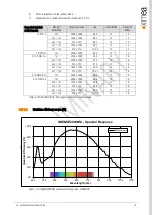
xiJ - Technical Manual Version 0.06
12
2.3.
Scientific Camera Applications
•
Fluorescence Resonance Energy Transfer
•
Fluorescence recovery after photobleaching
•
Fluorescence in situ hybridization
•
Total internal reflection fluorescence
•
Fluorescence correlation spectroscopy
•
Near Earth object detection
•
Astronomy
•
Photoactivated localization microscopy
•
Stochastic Optical Reconstruction Microscopy
•
Single Plane Illumination Microscopy
•
Optical coherence tomography
•
Coherent Anti-Stokes Raman Scattering
•
Bose-Einstein condensates
2.4.
Common features
Sensor technology
Scientific CMOS (sCMOS)
Acquisition modes
Rolling shutter, Global Reset Release
Sensor versions
Backside illuminated (BSI)
Image data formats
12, 16 bit RAW pixel data
Interface default
USB 3.1 Gen1 standard Type C compliant to USB3 Vision standard
The xiJ camera line comes with type-C interface to the host computer. At the time of
writing, the USB cameras utilize USB 3.1 gen1 definitions and yield a bandwidth of
about 400 Mbyte/s.
General purpose I/O
1x opto-isolated input, 1x opto-isolated output, 3x LED software programmable
Synchronization
Hardware and software trigger input, frame active output, busy output, overlapped
Lens mount
C-mount or T-mount (M42 x 0.75mm)
Cooling
Thermoelectric Peltier cooling and fan
Power consumption
3.4 Watt (16.8 W with Cooling ON) supplied via USB3 interface with PD - Power
delivery for Cooling
Size dimensions
52 x 52 x 62 mm (depends on version)
Weight
336 grams (depends on version)
Environment
Operating 0°C to 40°C on housing; RH 80% non-condensing; -30°C to 60°C storage
Conformity
CE, FCC, RoHS, GenICam/GenTL, USB 3.0 SuperSpeed
Operating systems
Windows 7 SP1 (x86 and x64) and 10, Linux Ubuntu, macOS
Host hardware
Support for x86/x64 and ARM platforms.
Minimum Requirements:
Intel i3 3.0GHz, +2GB RAM physical memory, NVIDIA or Radeon 128MB, Motherboard
with PCIe x1 Gen 2 slot, USB 3.0 host adapter with Power delivery
Software support
GenICam / GenTL and highly optimized xiAPI SDK (C/C++, C#, Python).
Support various image processing libraries (LabView, Matlab, MicroManager, …)
Firmware updates
Field firmware update through xiCOP tool
Viewer program
CamTool viewer
table 2-2, common features













































